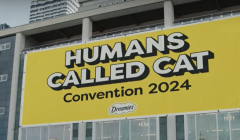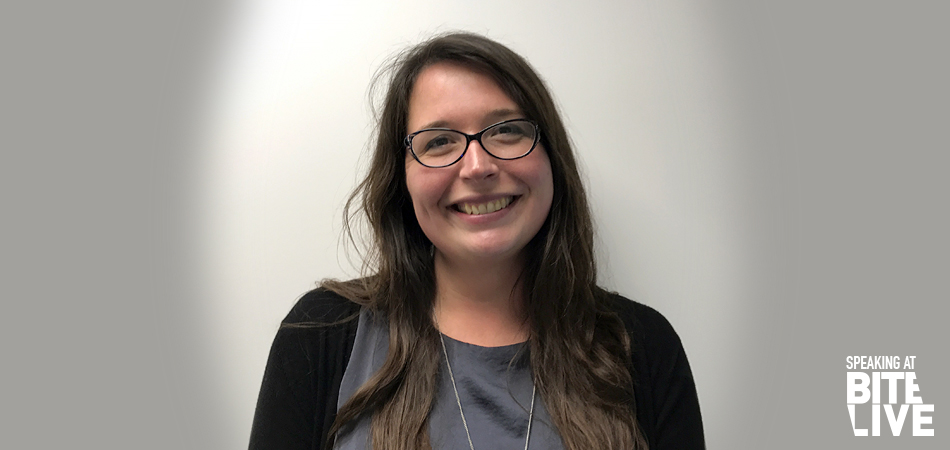
Dreamies investigation proves that the treats are irresistible to cats
The campaign by Adam&EveDDB concludes that the only cats who don’t love the pet treat are human Cats
Director of Communications, Stonewall


Career to date:
2017, Director of Communications, Stonewall
2014, Head of Communications, Mencap
2010, Head of Communications, Gingerbread
2009, Communications Manager, Community Development Foundation
2006, Communications Manager, Living Streets
Lucy Abell: Day-to-day, it’s making sure that Stonewall is getting its messages across as effectively as possible. We recently launched our new brand awareness campaign, the first one in 10 years and a year in the planning. We laboured over every syllable of every word in the straplines. But, back in April, we had 45 minutes warning about the General Election, something that we needed to react to from a comms perspective to get our messages out there and start activating our campaigners.
It’s that balance of what can we plan for, where can we lead conversations, and what are we going to have to react to, to make sure that we’re effectively lobbying on behalf of our target audience.
Lucy Abell: I’ve always worked in charity communications. I was elected to Leeds Student Union because I couldn’t bear to leave university and then got bitten by the bug. There’s something about working for campaigning organisations that presents a unique comms challenge that’s quite addictive. I’ve always been interested in social justice. For people who, through no fault of their own, don’t have much power in society.
I’ve worked more recently for Gingerbread, a charity for single parents. My roll before Stonewall was heading up the Comms team at Mencap, which works for people with learning disabilities.
“There needs to be a mechanism for people to show that they support human rights and LGBT equality. We want our campaign, Come out for LGBT, to do that job."
Lucy Abell: I’ve always admired their communications. Their iconic campaign “Some people are gay, get over it” is 10 years old and still bold. Seeing that on the side of a bus as a young gay man or bi woman, the impact it would have on you is incredible.
Stonewall is small enough to be bold and to take risks to cut through the noise that surrounds everything that charities are doing. That makes it a fun and challenging place to work.
Lucy Abell: Stonewall has always had a strong voice in debates but hadn’t done a brand campaign for the last 10 years. We’re trying to reach a really wide audience of people, either LGBT or those who support LGBT equality and want to be active in showing that support. Maybe they feel uncomfortable with the things that are happening in the world, Trump being so trans-phobic, the government having an agreement with the DUP who are against gay marriage.
There needs to be a mechanism for people to show that they support human rights and LGBT equality. We wanted our campaign to do that job. We’ve made a big impact with Come Out For LGBT, by working with agencies that share our values. We’re a small charity so we have to find people whose moral compass is the same as our own and who want to have an active voice.
Lucy Abell: We will always call out anybody who is homophobic, bi-phobic or trans-phobic in public life. We had a bit of a Twitter spat with Piers Morgan recently. He put forward some views that were absolutely not OK.
We have to be careful not to stay in our bubble. It’s a problem for a lot of charities that you talk to your supporters but that’s not going to shift the conversation. We have to reach outside the community and make people understand LGBT equality is something that everyone should care about.
We’ve had to negotiate some difficult conversations internally because language can be a massive barrier. People can be too scared to engage in a conversation about trans equality because they’re terrified they’re going to get the language wrong. We work with activists and the community to encourage them to be open to people getting it wrong initially, as long as the intentions are good. A big part of the recent campaign is to try and break down those language barriers.
Lucy Abell: Internally we have an incredibly diverse workforce and by diverse, we don’t just mean LGBT people. We’re actively trying to increase our BAME representation, because like a lot of organisations, we don’t have enough senior BAME representation. We’re open in our advertising, getting our job adverts into those communities as much as possible. Everything we do is completely anonymised in terms of application. It’s an active conversation at Stonewall; it needs to be because we need to represent the people we’re here to support.
Where it gets interesting is who we choose to work with in terms of agencies. There are a lot of agencies that talk about diversity but don’t back it up with real policies. That always gets found out because you can’t fake it. If your work force and creative team is homogenous, white, straight and London-centric, that inevitably limits how strong your creative output is. You need to see it to be it.
Lucy Abell: Finding an organisation that lives by the same values that you do. In terms of day-to-day relationship, it’s active listening between the key players. I’ve had bad experiences with agencies who have not listened and bad experiences with agencies where I’ve refused to listen.
Stonewall will always have better knowledge of LGBT issues than a creative agency, but we have to acknowledge that the creative agency is bringing specialism and skill. There were points with Come Out for LGBT where Mr President would say there’s a reason we’re suggesting this creative route and we’ve had to step back. If you can have challenging, open conversations with the agency and not waste time being over-sensitive but respect the skills that each of the partners is bringing, you will end up with a much stronger creative.
“If your work force and creative team is homogenous, white, straight and London-centric, that inevitably limits how strong your creative output is. You need to see it to be it."
Lucy Abell: My previous role was to lead the Comms team at Mencap. There are 1.4 million people with learning disabilities in Britain and they don’t have a voice. You rarely see them on TV; you don’t see them in advertising. We were about to launch a new brand campaign and were working with an agency that runs focus groups. We’d got trapped in a charity bubble; we were basically talking to ourselves. The focus group came back with the insight that people, if they’re honest, can be really frightened of people with a learning disability. They feel they’re unpredictable and they don’t understand what’s going on.
That wasn’t the answer we wanted but that was the truth. We were able to take that insight and create a positive campaign with the creative agency. Our focus became showing people with learning disabilities as individuals with their own personality. It completely changed our thinking in terms of how to approach comms at Mencap.
Lucy Abell: Our brand campaign is really new; we see it as being a three-year campaign. We want to use it as a unifying theme to reach into communities that we’re not in at the moment. For some LGBT people, if you’re lucky enough to be born into an understanding family, an accepting, inclusive community, that’s great. But for a lot of people in Britain, if you’re born into a working class community, a BAME or religious community, it’s still incredibly difficult to be LGBT in 2017. Our focus has to be on not only supporting LGBT people, but also working with their families, employers, teachers and help them move towards becoming allies. That’s a big cultural shift and our aim with the Come Out For LGBT message.
We’re a trans-inclusive organisation, we campaign on trans-equality and that is one area where there is so much work to do. Two in five trans teenagers will try and take their own life while two in five trans people have been subjected to a hate crime in the last 12 months. It affects every area of people’s lives; there’s a lot of misunderstanding about trans issues. That has to be one of our focuses as a comms team, to start trying to get positive messages out about what it means to be trans and to show the diversity of the trans population in Britain.
We work with big corporates and institutions as part of our Diversity Champions program, to help improve internal, inclusive policies and be more supportive of LGBT people. It’s about treating people as individuals and being respectful. It’s the same for any organisation. If your staff feel like they can bring their whole selves to work and not hide, you are going to get so much more out of them, whether that’s in a marketing agency or Essex Police Force.
Lucy Abell: It’s a massively important part of the business for us; it encompasses everything that we do. We can’t do everything on our own. And why a lot of our campaigns, like Rainbow Laces, have been so strong is because we have people like Manchester United saying homophobia is not acceptable in our stands; it’s because we’ve got adidas sponsoring Team Pride.
I work with the armed forces who, 10 years ago you would not have expected to be vocal on LGBT issues. They’ve been incredibly positive in moving forward with clear eyes, examining their own internal policies, making real changes. We had the most senior Generals in the British Army in a poster with the Secretary of their LGBT network saying Come Out For LGBT, being a really visible ally. It’s those unexpected partnerships that make a really big impact to try to get the change we need.
Lucy Abell: Some of the stories we hear about parents of transgender kids standing up to bullies and working with schools to change policies for their child is really inspiring.
What I’ve learnt from talking to LGBT people is that, as an ally, you don’t have to do the huge, grand gesture to make a difference in someone’s life. We don’t all have to be heroes but we can stand up for people when they need us to.
Ruth [Hunt – Chief Executive at Stonewall] said at my interview that Stonewell’s got a really important voice at the moment. There’s so much going on in terms of human rights being unstable in the world at the moment that actually we need to be loud, we need to be brave in standing up for stuff.
Lucy will be speaking alongside Laura Jordan-Bambach, CCO of Mr President, at BITE LIVE 2017
Looks like you need to create a Creativebrief account to perform this action.
Create account Sign inLooks like you need to create a Creativebrief account to perform this action.
Create account Sign in